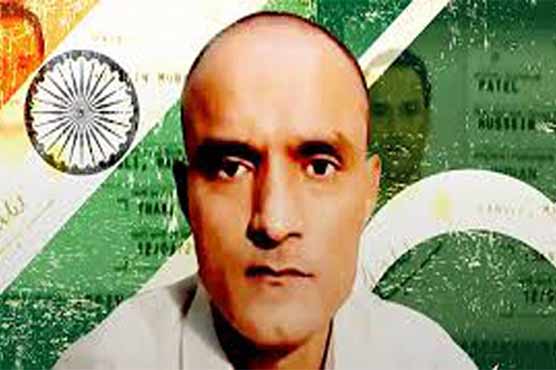Pakistan provides second consular access to Indian spy Kulbhushan Jadhav

Two consular officers of Indian HC were provided uninterrupted consular access to Commander Jadhav.
ISLAMABAD (Dunya News) – Pakistan on Thursday provided second consular access to Indian spy Commander Kulbhushan Jadhav at New Delhi’s request.
Foreign Office spokesperson Aisha Farooqui said first consular access under the Vienna Convention on Consular Relations 1963 was earlier provided by Pakistan on second September last year.
She said the mother and wife of Commander Jadhav were also allowed to meet him on 25 December 2017.
Aisha Farooqui said two consular officers of the Indian High Commission in Islamabad were provided unimpeded and uninterrupted consular access to Commander Jadhav.
The spokesperson said that Commander Jadhav is in Pakistan’s custody following his arrest from Balochistan in a counter-intelligence operation on 3 March 2016.
She said during investigation, Commander Jadhav confessed to his involvement in terrorist activities inside Pakistan that resulted in loss of many precious human lives.
Aisha Farooqui said Commander Jadhav also made important revelations about RAW’s role in sponsoring state terrorism in Pakistan.
She said Pakistan remains committed to fully implementing the International Court of Justice’s judgment of 17 July last year.
The spokesperson expressed the hope that India will cooperate with the Pakistan court in giving full effect to the said judgement.
ICJ rejects Indian plea for Jadhav’s release
On July 17, 2019, the ICJ had rejected remedies sought by India, including annulment of military court decision convicting Kulbhushan Jadhav, his release and safe passage to India.
Announcing the verdict Judge Abdulqavi Ahmed Yousaf told Pakistan to review the death sentence for an alleged Indian spy, saying Islamabad violated his rights to consular visits.
The court, in its verdict, rejected a number of Indian demands including annulment of military court decision convicting Jadhav, his release and safe passage to India.
The ICJ found that Pakistan deprived India of the right to communicate with and have access to Kulbhushan Jadhav, to visit him in detention and to arrange for his legal representation, and thereby breached obligations incumbent upon it under Vienna Convention on Consular Relations.
The tribunal in The Hague ordered an "effective review and reconsideration of the conviction and sentence of Kulbhushan Sudhir Jadhav".
The judge remarked that Pakistan and India are signatories of the Vienna Convention.
"A continued stay of execution constitutes an indispensable condition for the effective review and reconsideration of the conviction and sentence of Mr Kulbhushan Sudhir Jadhav," it ruled.
The court while finding Jadhav guilty of committing terrorist activities inside Pakistan, ordered that the Indian spy cannot be handed over to India. Kulbhushan will remain in Pakistan’s custody, it ruled.
Pakistani team headed by the attorney general was present in the courtroom. The team also included then Foreign Office Spokesperson Dr Muhammad Faisal.
Jadhav’s confession and trial
Government arrested Jadhav alias Hussein Mubarak Patel in the province of Balochistan on charges of terrorism and spying for India‘s intelligence agency, the Research and Analysis Wing (RAW).
The government stated that he was a serving commander in the Indian Navy who was involved in subversive activities inside Pakistan and was arrested on March 3, 2016 during a counter-intelligence operation in Mashkel, Balochistan. The Indian government recognized Jadhav as a former naval officer but denied any current links with him and maintained that he took premature retirement and was abducted from Iran.
On March 25, 2016, the Inter-Services Public Relations (ISPR) released the confessional statement of Jadhav where he claimed to be a serving Indian Navy officer.
"By 2002, I commenced intelligence operations. In 2003, I established a small business in Chabahar in Iran," he admitted. "As I was able to achieve undetected existence and visits to Karachi in 2003 and 2004. Having done some basic assignments within India for RAW, I was picked up by RAW in 2013 end".
He said his purpose was to meet Baloch insurgents and carry out "activities with their collaboration".
On April 8, 2017, ISPR lodged a first information report (FIR) against him whereas on April 11, 2017, Chief of Army Staff (COAS) General Qamar Javed Bajwa had confirmed death sentence of Jadhav who was tried through Field General Court Martial (FGCM) under Pakistan Army Act (PAA). He was tried under section 59 of Pakistan Army Act (PAA) 1952 and Section III of official Secret Act of 1923.
FGCM found Kulbushan SudhirYadhav guilty of all the charges. He confessed before a Magistrate and the Court that he was tasked by RAW to plan, coordinate and organize espionage and sabotage activities aiming to destabilize and wage war against Pakistan by impeding the efforts of Law Enforcement Agencies for restoring peace in Balochistan and Karachi.
On May 8, 2017, India approached the ICJ against Pakistan for denying consular access to Jadhav.
On May 18, 2017, the ICJ stayed the execution pending the final judgment on the case and even on July 13, 2018, ICJ stayed Kulbhushan Jadhav’s execution in Pakistan.
On June 22, 2017, Jadhav gave a second confessional statement where he confessed to carrying out subversive activities in Balochistan.
On Feb 22, 2019, ICJ reserved its judgment in Jadhav case whereas they are going to rule the verdict today on July 17, 2019.


